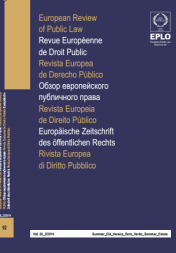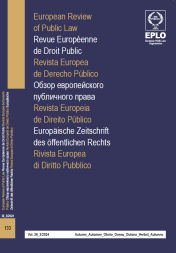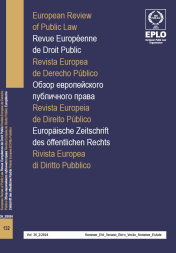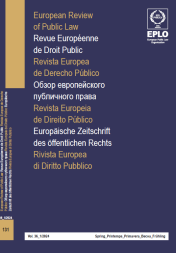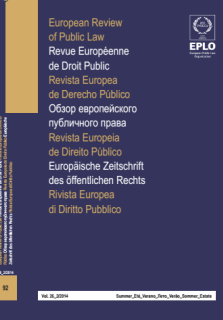
Editorial
ERPL, vol. 25, no 4, winter 2013 (90)
In this ERPL issue, there are five articles on different public law issues. The contribution of EGPL members in the Articles section of this issue is quite evident. The first article aims to show the parallel development of constitutional justice and electoral justice as necessary components of a democratic State and of advanced law, institutions which are foreseen in the Portuguese Constitution of 1976. In the second article, the US Supreme Court decision Citizens United v. FEC is analysed, as the decision changed some of the basic premises for the regulation of election campaign financing in the United States. Furthermore, the implications for future campaign finance law and practice are discussed. The principle of horizontal subsidiarity as a new principle which seems to reintroduce public intervention to support and guarantee benefit entitlements in Italy is analysed in the third article published in this ERPL issue. Focusing on the right to health, the fourth article considers the influence of the European model on the national legal system and the effects of the difference between the Italian model (where the right to health is a constitutional right) and the European model (where the right of access to health care and medical treatment is guaranteed under conditions established by laws). Last but not least, in the final article in this ERPL issue, the use of the term "people" and the underlying legal controversies are discussed for the Constitutions of the United States of America, Germany and Spain. Also the development of the European Union is analyzed as there is a tendency of emancipation from the national peoples.
In the section of chronicles on Constitutional Law, Armenia inaugurates its representation in the ERPL by a chronicle on the Constitutional Court of the Republic of Armenia. The method and basic principles of the activity of the CC of the RA, its powers, the procedure of activity of its members and other details of the organisation of the CC's activities are presented in this chronicle.
Another chronicle deals with the 'ERT S.A. incident", the decision of the Government to shut down instantly the operation of the Greek state radio and TV broadcasting corporation and the reflections of the judiciary on the duty of the state to provide public services.
The following chronicle examines the features of Latvian constitutional law in 2012, a year when 90 years elapsed since the adoption and coming into force of the Satversme (Constitution). The contribution of constitutional law in dealing with issues of law relevant in the present era and to the solution of economic issues and the development of the doctrine of continuity of the Republic of Latvia is presented along with the call to discuss constitutional reforms.
In the following chronicle on Constitutional Law the main changes in Polish legislation, which concerned freedom of assemblies, are presented. Some changes also concern the press whereas three important judgments of the Constitutional Court on the constitutionality of legislation pertaining to the powers of the President of the Republic are analysed. Other important judgments on the rule-making powers of the Supreme Court, the freezing of the judges' salaries, the freedom of association and the criminal procedures are examined.
Next, a contribution to the academic debate in Serbia regarding the constitutionality of the Statute of the Autonomous Province of Vojvodina as well as a well-grounded response to the crucial questions related to the legal nature, legal strength and subject of regulation of the Statute and the constitutional frame and limitations regarding the regulation of the provincial government, are provided.
Continuing in this section of chronicles, the ERPL readers will find a chronicle on Spanish Constitutional Law, depicting the constitutional, political and legislative evolution of the Kingdom of Spain during 2012 as well as the most relevant judgments of the Spanish Constitutional Court which have been decided in the same period. Are emphasized: the wide passing of 29 Royal Decree-Laws, the high number of laws in economic and labour matters, the legislation on the so-called rescue of the Spanish financial sector, on the rationalisation of the public expenditure in the educational area and on guaranteeing the sustainability of the National Health System. In addition, emphasis is placed on the Constitutional Court decision which declared as compliant with the Constitution the same-sex marriages. Finally, it is stressed that 2012 has been the year of commemoration of the bicentenary of the Cádiz Constitution, the first Spanish Constitution.
In the section of Administrative Law, a chronicle coming from Germany comments on the decisions of the Federal Administrative Court, which during the period under review were again characterised by the complex nature of legal theory, dynamics and openness to evaluation.
The next chronicle comes from Finland and presents developments in the field of Administrative Law, among which with regard to the Parliamentary Ombudsman overseeing the observance of fundamental and human rights and with regard to the Supreme Administrative Court in which there has been an increase in cases concerning foreigners, accounting now for one fourth of all the cases brought before it.
The chronicle on Latvian Administrative Law provides an overview on modifications occurred during 2012 in the Administrative Procedure Law, the Construction Law, the Law on State Revenue Service and the Law on the Prevention of Conflict of Interest of Public Officials as well as an overview of several decisions of the Department of Administrative Cases of the Supreme Court of Latvia on matters of administrative procedure.
The Polish Administrative Law chronicle first refers to the conference on the Chairs of Administrative Law and Administrative Procedure on the theme "The crisis of administrative law in public administration", held in 2012. Second, it presents a number of interesting decisions taken by the Constitutional Tribunal and by the Supreme Administrative Court during this period, and other relevant developments such as the establishment of the Construction Law Codification Commission.
Next, the chronicle on Serbian Administrative Law presents the measures taken in Serbia in order to successfully implement public administration reform and more in particular it refers to the draft Public Administration Reform Strategy 2013-2016 which covers the entire public sector.
Continuing in this section, the chronicle on Spanish Administrative Law examines the legislation enacted by the State (and basic) Legislator during the year 2013 and comments in detail on three laws of this period: Organic Law 8/2013, of December 9, to Improve the quality of the public educational system; Law 19/2013, of December 9, on Transparency, the right to public information and good governance; and Law 27/2013, of December 27, on the Rationalisation and sustainability (economic) of the Local Administration.
In the section of Jurisprudence, a chronicle discusses the judgment of the CJEU of September 11, 2012 (OJ of the European Union of November 17), answering fourteen preliminary questions raised by the Hellenic Supreme Court in connection with a river deviation project.
The volume concludes by an Analytical Table of Contents of all four volumes of the year 2013 of the European Review of Public Law.
Overall, this is an issue of the ERPL where, as is the standard pursued by the Review, authors coming from many countries present developments on the public law of their countries confirming the multinational character of the Review.
SUMMARY / SOMMAIRE
ARTICLES
J. MIRANDA, Elections and Electoral Legislation [IN PORTUGUESE]
J.A. JENSEN, The Legal Regulation of the Financing of Election Campaign in the United States Before and After the Citizens United Case [IN ENGLISH]
N. PERLO, The Principle of Horizontal Subsidiarity and the Guarantee of Benefit Entitlements in Italy [IN FRENCH]
B. PEZZINI, Right to Health and Health Services: Law-policy Interplay through Italian and European Rules [IN NEGLISH]
TH. GROSS, "We the People" - What is the Legal Meaning of "People"? [IN ENGLISH]
CHRONICLES / CHRONIQUES
I. Constitutional Law / Droit constitutionnel
Р. АКОПЯН, Armenia / Arménie [IN RUSSIAN]
A. I. POTTAKIS, Greece / Grèce [ IN ENGLISH]
A. RODIŅA / D. AMOLIŅA, Republic of Latvia / République de Lettonie [IN ENGLISH]
K. WOJTYCZEK, Poland / Pologne [IN ENGLISH]
T. KORHECZ / K. BERETKA, Serbia / Serbie [IN ENGLISH]
F. M. GARCÍA COSTA, Spain / Espagne [IN SPANISH]
II. Administrative Law / Droit administratif
M. BRENNER / J. HYCKEL, Federal Republic of Germany / République Fédérale d'Allemagne [IN GERMAN]
K. KUUSIKKO, Finland / Finlande [IN ENGLISH]
J. BRIEDE, Republic of Latvia / République de Lettonie [IN ENGLISH]
J. CZLOWIEKOWSKA, Poland / Pologne [IN FRENCH]
A. ČAVOSKI, Serbia / Serbie [IN ENGLISH]
L. F. MAESO SECO, Spain / Espagne [IN SPANISH]
II. Jurisprudence
M. M. OVIEDO SOLER, Jurisprudence,
Court of Justice of the European Union /
Cour de justice de l'Union européenne [IN SPANISH]
ANALYTICAL TABLE / TABLE ANALYTIQUE















